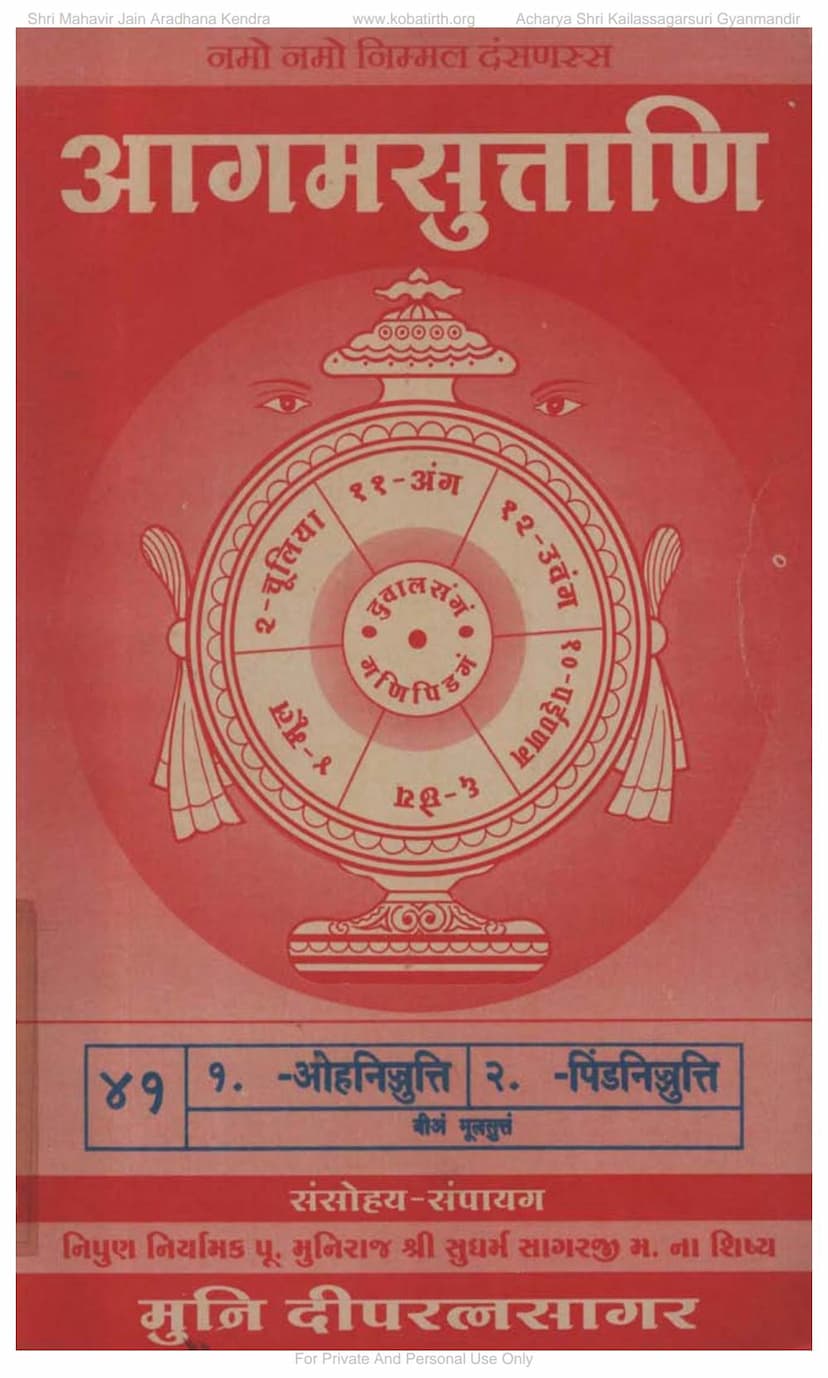Agam 41A Pindnujjutt Mulsutt 02A Moolam
Added to library: September 1, 2025

Summary
This Jain text, titled "Agam 41A Pindnujjutt Mulsutt 02A Moolam" authored by Dipratnasagar and Deepratnasagar, published by Agam Shrut Prakashan, is a complex and detailed exposition of Jain monastic discipline and conduct, specifically focusing on the principles of Pindnijjutt (consumption of food and alms) and related practices. The text appears to be part of a larger collection of Jain Agamas (canonical scriptures).
Here's a breakdown of the content based on the provided pages:
Core Subject Matter:
- Monastic Conduct (Achara): The primary focus is on the strict rules and regulations that Jain monks and nuns must follow. This includes detailed guidance on the acquisition, purification, and consumption of food and alms, as well as the proper use and care of essential monastic belongings (upadhi).
- Purity and Non-violence (Ahimsa): A significant emphasis is placed on maintaining purity in all aspects of life, especially concerning food, to uphold the principle of Ahimsa (non-violence). This involves avoiding harm to any living beings, whether visible or invisible, in the process of obtaining and consuming sustenance.
- Self-Discipline and Restraint (Samyama): The text details various forms of self-discipline, including control over the senses, mind, speech, and actions. This is crucial for spiritual progress and liberation.
- Ethical Principles: The book delves into the ethical considerations for ascetics, covering aspects like proper inquiry, avoiding attachment, and the significance of right-faith (samyak darshan) and right-conduct (samyak charitra).
Key Themes and Sections (Inferred from Content and Titles):
- "Ohanijutti" and "Pindanijjuti": These terms appear prominently, suggesting sections dedicated to the rules of alms-gathering and the precise methods of consumption. The extensive list of Gaha (verses) from page 10 onwards under "Ohanijutti" indicates a deep and granular exploration of these practices.
- "Upadhi Pramana Dar" (Rules of Belongings): The text likely outlines the permissible and prohibited monastic possessions, their proper handling, and the principles governing their use.
- "Anayayana Vaja Dar" (Rules of Avoiding Improper Places/Situations): This section probably addresses situations and places that an ascetic should avoid to maintain purity and prevent harm.
- "Pratishevana Dar" (Rules of Consumption/Service): This could refer to the proper way of receiving and consuming food or serving others.
- "Alochan Dar" (Rules of Confession/Acknowledgement): This might cover the procedures for confessing faults or acknowledging transgressions.
- "Visodhi Dar" (Rules of Purification): This section likely explains the methods and principles for purifying oneself and one's belongings.
- "Sangrah" (Collection/Summary): Some sections might be summaries or collections of specific rules or principles.
- "Prakirna" (Miscellaneous/Ancillary Texts): The later pages (Page 6 onwards) list numerous other Jain texts published by the same publisher, including various Agamas, commentaries, and devotional works. This contextualizes the current text as part of a broader effort to preserve and disseminate Jain literature.
- "Parishishtha" (Appendices): Page 9 mentions appendices related to index, glossary of specific words, and names found in the Agamas.
Structure and Style:
- Verse-based (Gaha): The text is primarily composed of verses (Gaha), which are characteristic of ancient Jain scriptures. These verses are often followed by a commentary or explanation.
- Detailed and Prescriptive: The language is highly detailed and prescriptive, leaving little room for ambiguity in the rules and regulations it lays out for ascetics.
- Commentary and Explanation: The presence of scholarly insights, as indicated by the author's lineage (pupil of Muni Shri Sudharma Sagarji M.), suggests that the text provides explanations and clarifications of the verses.
- Sponsorship and Contributors: The extensive lists of donors and supporters (Pages 3-5) highlight the significant community effort and financial backing required to publish such religious and scholarly works.
Significance:
This text is a crucial resource for understanding the intricate details of Jain monastic life, emphasizing the meticulous adherence to principles of purity, non-violence, and self-control. It provides a window into the rigorous practices undertaken by Jain ascetics in their pursuit of spiritual purification and liberation. The comprehensive nature of the "Ohanijutti" section, with its numerous verses, underscores the importance placed on even the most minute aspects of an ascetic's daily life.
In essence, "Agam 41A Pindnujjutt Mulsutt 02A Moolam" is a scholarly and devotional work that meticulously outlines the essential code of conduct for Jain monks and nuns, with a particular focus on their relationship with food, alms, and possessions, all within the framework of Jain philosophy and ethics.